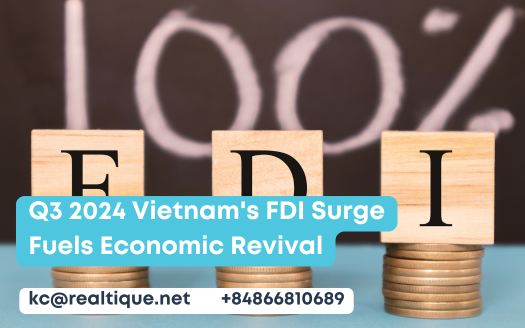Q3 2024 Vietnam’s FDI Surge Fuels Economic Revival
Vietnam’s recent surge in foreign direct investment (FDI) signals a noteworthy turning point for its economy, with nearly 25 billion USD recorded in just the first nine months of 2024. This 11.6% increase year-on-year, alongside a significant disbursement of 17.3 billion USD, highlights the nation’s growing attractiveness to foreign investors. Regions such as Bac Ninh and Dong Nai emerge as key beneficiaries, sparking job creation and technological advancements. However, the environment is not without its challenges, prompting an inquiry into the sustainability of this growth path. What implications might these developments hold for Vietnam’s future?
The recent surge in Foreign Direct Investment (FDI) in Vietnam reflects a dynamic shift in the country’s economic environment.
FDI attracted in Vietnam reached nearly 25 billion USD in the first nine months of 2024, marking an 11.6% increase compared to the same period in 2023.
Actual disbursement of FDI achieved 17.3 billion USD, representing an 8.9% rise—the highest in five years.
Notably, September 2024 saw FDI registration account for 17.2% of the total, approximately 4.26 billion USD.
These trends indicate a strong recovery that surpasses pre-COVID-19 levels, highlighting Vietnam’s growing appeal as an investment destination.
This positive path emphasizes the nation’s potential for sustainable economic growth driven by foreign capital inflows.
Key Contributors to Vietnam's FDI Growth
Several factors have significantly contributed to the strong growth of Foreign Direct Investment (FDI) in Vietnam. Notably, Bac Ninh province emerged as a leader, accounting for 18% of total FDI with approximately 4.5 billion USD.
Key projects, such as Amkor Technology‘s substantial investment of 1.07 billion USD in manufacturing, have strengthened this trend. Additionally, Foxconn’s FCPV project in Bac Ninh, registered at 383.3 million USD, exemplifies the increasing investor confidence in the area.
The establishment of industrial zones, particularly the Vietnam-Singapore Industrial Park (VSIP) in Bac Ninh, has attracted significant capital inflow. Other regions, including Dong Nai and Ba Ria-Vung Tau, have also made notable contributions to Vietnam’s FDI environment, further enhancing the country’s economic prospects.
Regional Developments in FDI
Reflecting the lively scenery of Vietnam’s economy, regional developments in Foreign Direct Investment (FDI) have showcased significant growth across various provinces.
Dong Nai province recorded nearly 1.2 billion USD in FDI within the first nine months of 2024, emphasizing the establishment of green industrial parks.
Ba Ria-Vung Tau experienced an extraordinary 3.35-fold increase in FDI, welcoming 48 new projects.
Meanwhile, Ninh Thuan emerged as a notable player, securing over 910 million USD in newly registered capital, placing it among the top ten provinces for FDI attraction.
Additionally, southern regions, including Ho Chi Minh City, continue to maintain competitiveness in the FDI environment.
Emerging stars like Dong Nai, Ba Ria-Vung Tau, and Ninh Thuan highlight Vietnam’s diverse investment opportunities.
Economic Impact of FDI
Frequently, Foreign Direct Investment (FDI) serves as a critical driver of economic growth in Vietnam, significantly influencing various sectors and contributing to national stability.
The substantial inflow of FDI has strengthened Vietnam’s recovery from economic challenges, evidenced by a notable increase in actual disbursement, which reached 17.3 billion USD in 2024.
Additionally, FDI enhances technological transfer, raises local industry standards, and creates job opportunities, encouraging overall development.
However, challenges such as unmet investment targets and a decline in planned FDI remain pertinent.
To address these issues, the government is promoting sustainable investment strategies, aligning with global trends towards green growth.
This focus not only stabilizes the economy but also prepares Vietnam for future global investment environments.
Future Outlook and Challenges
There is a cautiously optimistic outlook for Vietnam’s Foreign Direct Investment (FDI) environment in the coming quarters, driven by anticipated improvements in logistics and transportation systems.
However, challenges persist, including skills shortages and constraints within the labor market that could deter potential investors.
Furthermore, the intricacies of visa and labor permit processes remain significant barriers, impacting foreign business operations.
Despite these challenges, a positive sentiment prevails, with 67% of EuroCham members expressing confidence in Vietnam’s investment climate.
As the government continues to implement policies favoring sustainable and green investments, the balance between attracting FDI and addressing these concerns will be essential for nurturing a resilient economic environment and sustaining growth in the years ahead.





